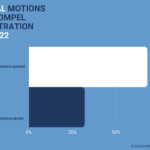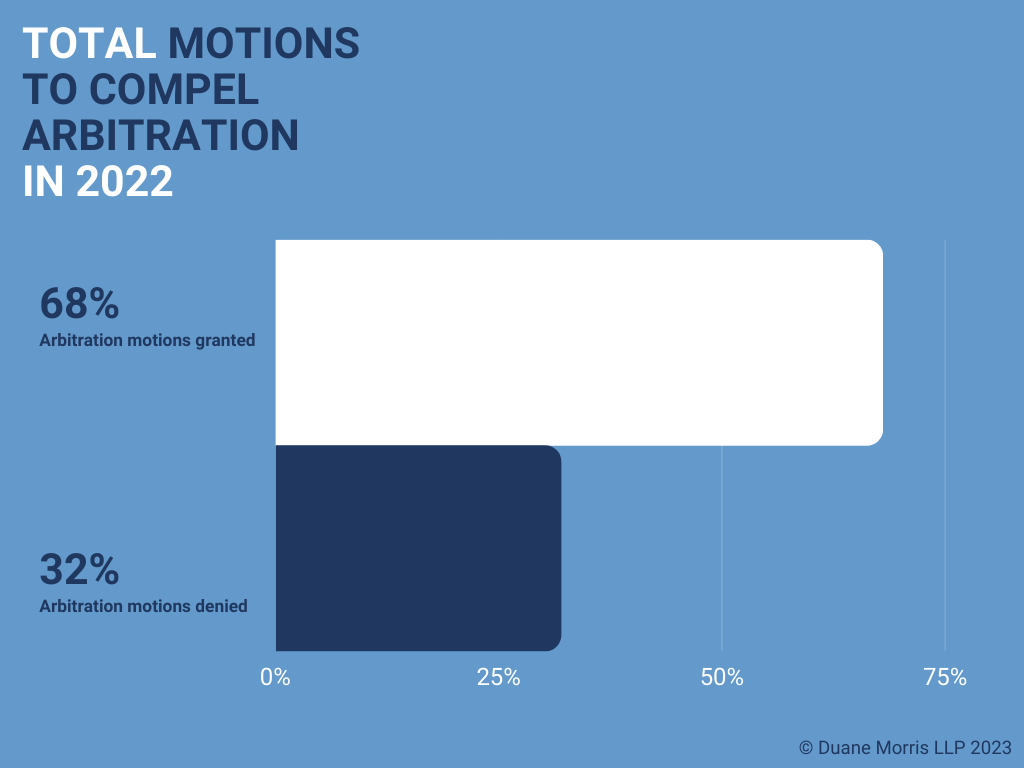 By Gerald L. Maatman, Jr. and Jennifer A. Riley
By Gerald L. Maatman, Jr. and Jennifer A. Riley
Duane Morris Takeaway: Of all defenses, a defendant’s ability to enforce an arbitration agreement containing a class or collective action waiver may have had the single greatest impact in terms of shifting the pendulum of class action litigation. With its decision in Epic Systems Corp. v. Lewis, et al., 138 S. Ct. 1612 (2018), the U.S. Supreme Court cleared the last hurdle to widespread adoption of such agreements. In response, more companies of all types and sizes updated their onboarding materials, terms of use, and other types of agreements to require that any disputes be resolved in arbitration on an individual basis. To date, companies have enjoyed a high rate of success enforcing those agreements and using them to thwart class actions out of the gate.
Statistically, corporate defendants fared well in asserting the defense. Across various areas of class action litigation, the defense won approximately 68% of motions to compel arbitration (roughly 69 motions granted in 102 cases).
By almost any measure, the arbitration defense had a tumultuous year in 2022. In the courts, chinks in the armor of the defense began to grow. While the U.S. Supreme Court shut down state efforts to evade arbitration of wage and hour claims, as discussed above, it limited application of the FAA to workers who participate in interstate transportation. Perhaps more significantly, on the legislative front, Congress significantly limited the availability of arbitration for cases alleging sexual harassment or sexual assault when it passed the Ending Forced Arbitration of Sexual Assault and Sexual Harassment Act. President Biden signed the Act into law on March 3, 2022.
The Act amends the FAA and provides a plaintiff the discretion to enforce pre-dispute arbitration provisions and class and collective action waivers in cases where he or she alleges “conduct constituting a sexual harassment dispute or a sexual assault dispute” or is “the named representative of a class or in a collective action alleging such conduct.” In other words, whereas the Act does not render such agreements invalid, it allows the party bringing sexual assault or sexual harassment claims to elect to enforce them or avoid them. The Act does not impact agreements entered into after a dispute arises.
The plaintiffs’ bar often alleges other claims along with claims for sexual assault or sexual harassment. Whereas the Act refers to a “case,” it remains to be seen whether courts will attempt to limit a plaintiff’s option to avoid pre-dispute arbitration to sexual assault or sexual harassment claims or will extend such option to all claims at issue in a case. The Act provides that “no pre-dispute arbitration agreement or pre-dispute joint-action waiver shall be valid or enforceable with respect to a case which is filed under Federal, Tribal, or State law and relates to the sexual assault dispute or the sexual harassment dispute.” To date, courts have not issued significant decisions interpreting such language.
Given the impact of the arbitration defense, in 2023, companies may face additional hurdles, on the judicial or the legislative front, as the plaintiffs’ bar continues to look for workarounds. In particular, we expect to see litigation over whether the Act’s use of the word “case” renders the statute applicable to all claims in the case, including claims other than sexual harassment and sexual assault and whether the statute, therefore, will allow for a broader shield to the arbitration defense.

